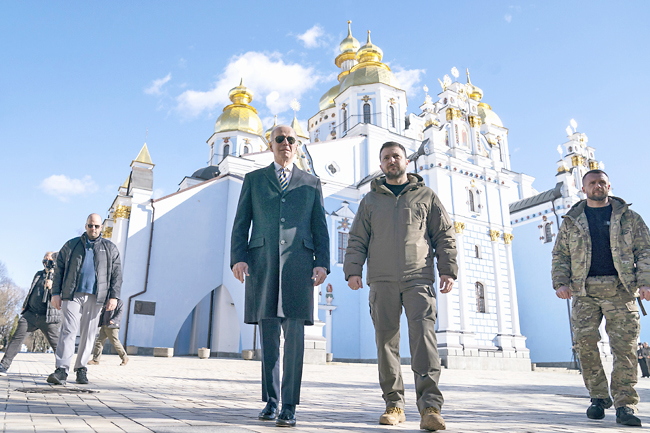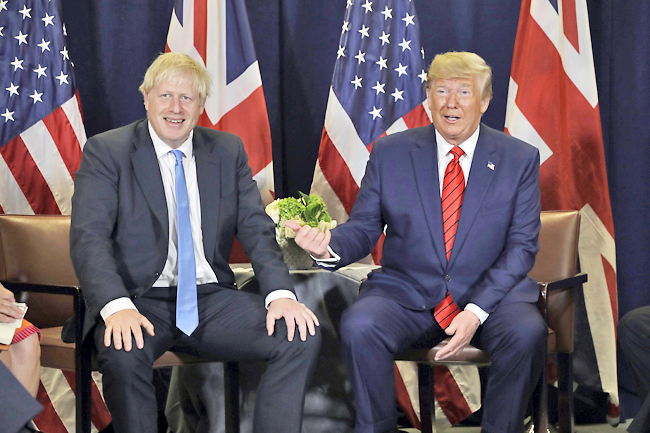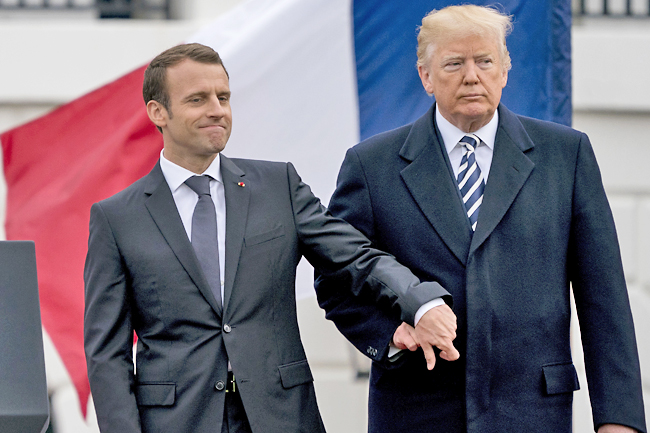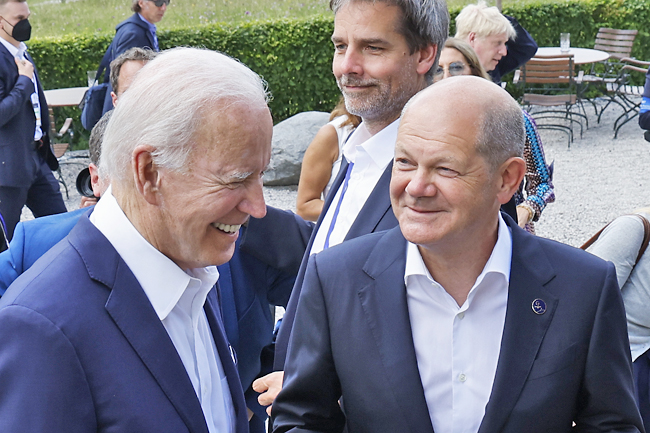LONDON (AP) – As chances rise of a Joe Biden-Donald Trump rematch in the United States (US) presidential election, America’s allies are bracing for a bumpy ride.
Many worry that a second term for Trump would be an earthquake, but tremors already abound – and concerns are rising that the US could grow less dependable regardless of who wins.
With a divided electorate and gridlock in Congress, the next American president could easily become consumed by manifold challenges at home – before even beginning to address flashpoints around the world, from Ukraine to the Middle East.
French President Emmanuel Macron’s recent verdict was blunt: America’s “first priority is itself”.
The first Trump administration stress-tested the bonds between the US and its allies, particularly in Europe. Trump derided the leaders of some friendly nations, including Germany’s Angela Merkel and Britain’s Theresa May, while praising Turkish President Recep Tayyip Erdogan and Russian leader Vladimir Putin.
In campaign speeches, Trump remains sceptical of organisations such as NATO, often lamenting the billions the US spends on the military alliance whose support has been critical to Ukraine’s fight against the invasion.
He said at a rally on Saturday that, as president, he’d warned NATO allies he would encourage Russia “to do whatever the hell they want” to countries that didn’t pay their way in the alliance.




Trump also wrote on his social media network that in future the US should end all foreign aid donations and replace them with loans.
NATO Secretary-General Jens Stoltenberg warned that Trump risked endangering US troops and their allies. “Any suggestion that allies will not defend each other undermines all of our security, including that of the US, and puts American and European soldiers at increased risk,” he said in a statement on Sunday.
Biden, meanwhile, has made support for Ukraine a key priority and moral imperative. But Biden’s assertion after his election in 2020 that “America is back” on the global stage has not been entirely borne out. Congressional Republicans have stalled more military aid for Ukraine, while America’s influence has been unable to contain conflict in the Middle East Director of the Centre on US Politics at University College London Thomas Gift said that whoever wins the presidential race, the direction of travel will be the same – toward a multipolar planet in which the United States is no longer “the indisputable world superpower”.
Most allied leaders refrain from commenting directly on the US election, sticking to the line that it’s for Americans to pick their leader.
They are conscious that they will have to work with the eventual winner, whoever it is – and behind the scenes, governments will be doing the “backroom work” of quietly establishing links with the contenders’ political teams, said Richard Dalton, a former senior British diplomat.
But many of America’s European NATO allies are worried that with or without Trump, the US is becoming less reliable. Some have started to talk openly about the need for members to ramp up military spending, and to plan for an alliance without the US.
German Chancellor Olaf Scholz said he was “currently on the phone a lot with my colleagues and asking them to do more” to support Ukraine. Germany is the second-largest donor of military aid to Kyiv, behind the US, but Scholz recently told German weekly Die Zeit that the country couldn’t fill any gap on its own if “the US ceased to be a supporter”.
Trump’s comments on Saturday about NATO rang alarm bells in Poland, which shares a border with Ukraine. “We have a hot war at our border,” Polish Prime Minister Donald Tusk said on Sunday.
He warned: “We must realise that the EU cannot be an economic and civilisational giant and a dwarf when it comes to defence, because the world has changed.”
Macron also suggested American attention was focused far from Europe. “This is also why I want a stronger Europe, that knows how to protect itself and isn’t dependent on others,” Macron said at a January news conference.
Trump does have supporters in Europe, notably pro-Russia populists such as Hungary’s Orbán.
But former British Prime Minister Boris Johnson raised some eyebrows when he argued recently that “a Trump presidency could be just what the world needs”.
Johnson said in a Daily Mail column that he didn’t believe Trump would “ditch the Ukrainians”, but instead would help Ukraine win the war, leaving the West stronger “and the world more stable”.
Bronwen Maddox of the international affairs think tank Chatham House said arguments like that underestimate “how destabilising” Trump has been, and likely would continue to be if reelected.
Former UK ambassador to Iran Dalton said prospects for the Middle East would be “slightly worse” under Trump than Biden.
Palestinians and their supporters, meanwhile, implore Biden to temper US support for Israel as the civilian death toll from the war in Gaza climbs. But hardliners in Israel argue the US is already restraining the offensive against Hamas too much.
Israel’s far-right national security minister Itamar Ben-Gvir recently said Biden was not giving Israel his “full backing” and that “if Trump was in power, the US conduct would be completely different”.
Much like its allies, America’s rivals are not openly expressing a preference for the election outcome.
Trump developed a strong rapport with Turkyie’s Erdogan, calling them “very good friends” during a 2019 meeting at the White House.
Yet Turkyie-US relations were fraught during his tenure.
The Trump administration removed Turkyie from its F-35 fighter jet project over Ankara’s decision to purchase Russian-made missile defence systems, while Trump himself threatened to ruin Turkyie’s economy.
Russian Foreign Minister Sergey Lavrov told CBS in January that he doesn’t “believe there will be any difference” between a Trump and a Biden presidency.
He argued that Russia-US relations have been going downhill since George W Bush’s administration.
China, where leaders’ initial warmth toward Trump soured into tit-for-tat tariffs and rising tensions, little changed under Biden, who continued his predecessor’s tough stance.
Professor of international relations Zhao Minghao at Fudan University in Shanghai said that for China, the two candidates were like “two ‘bowls of poison’.”
Gift, from University College London, said the move to a more fractured world is “going to happen regardless of whether Donald Trump or Joe Biden is elected”.
“It’s just sort of a reality,” he said.






